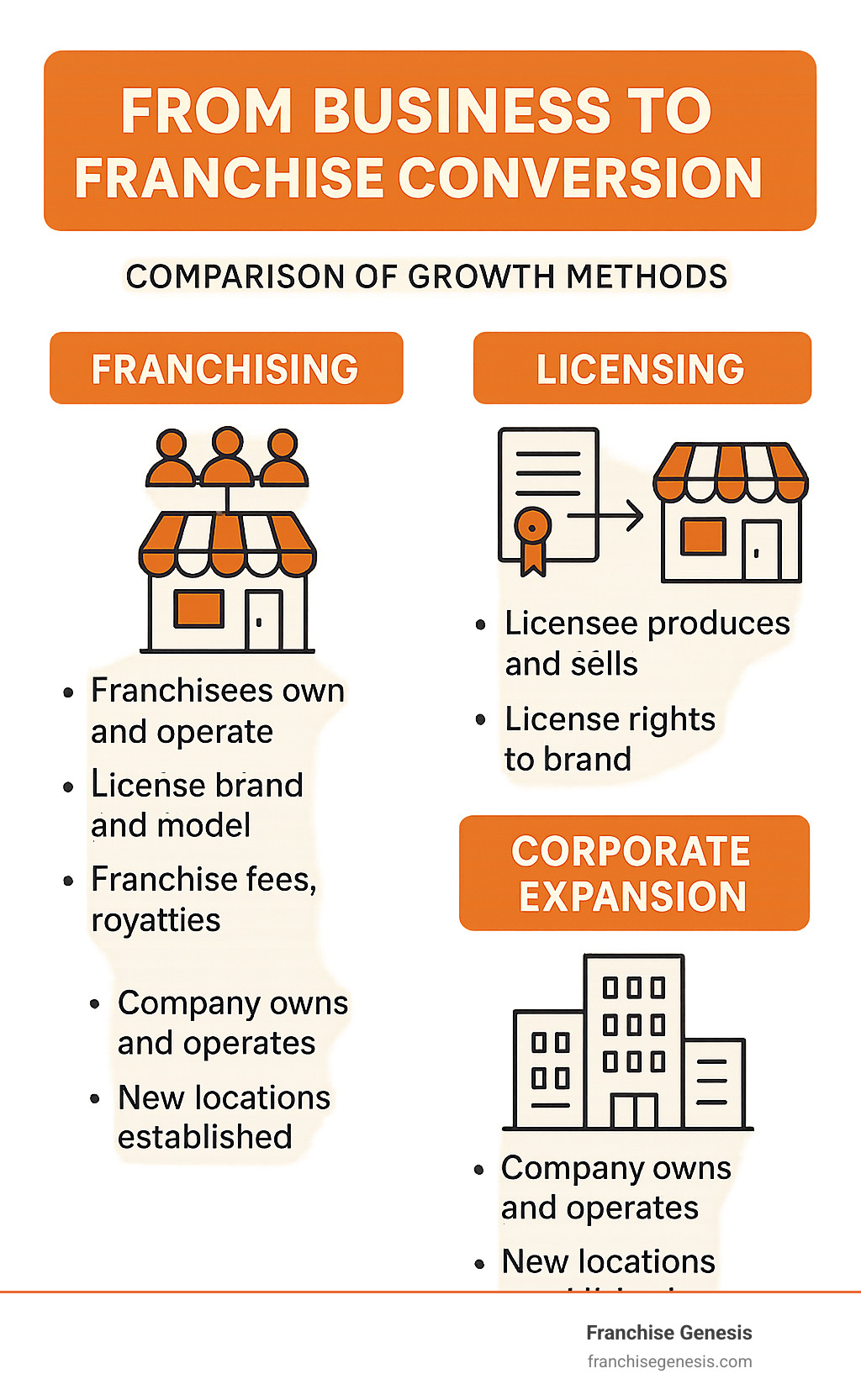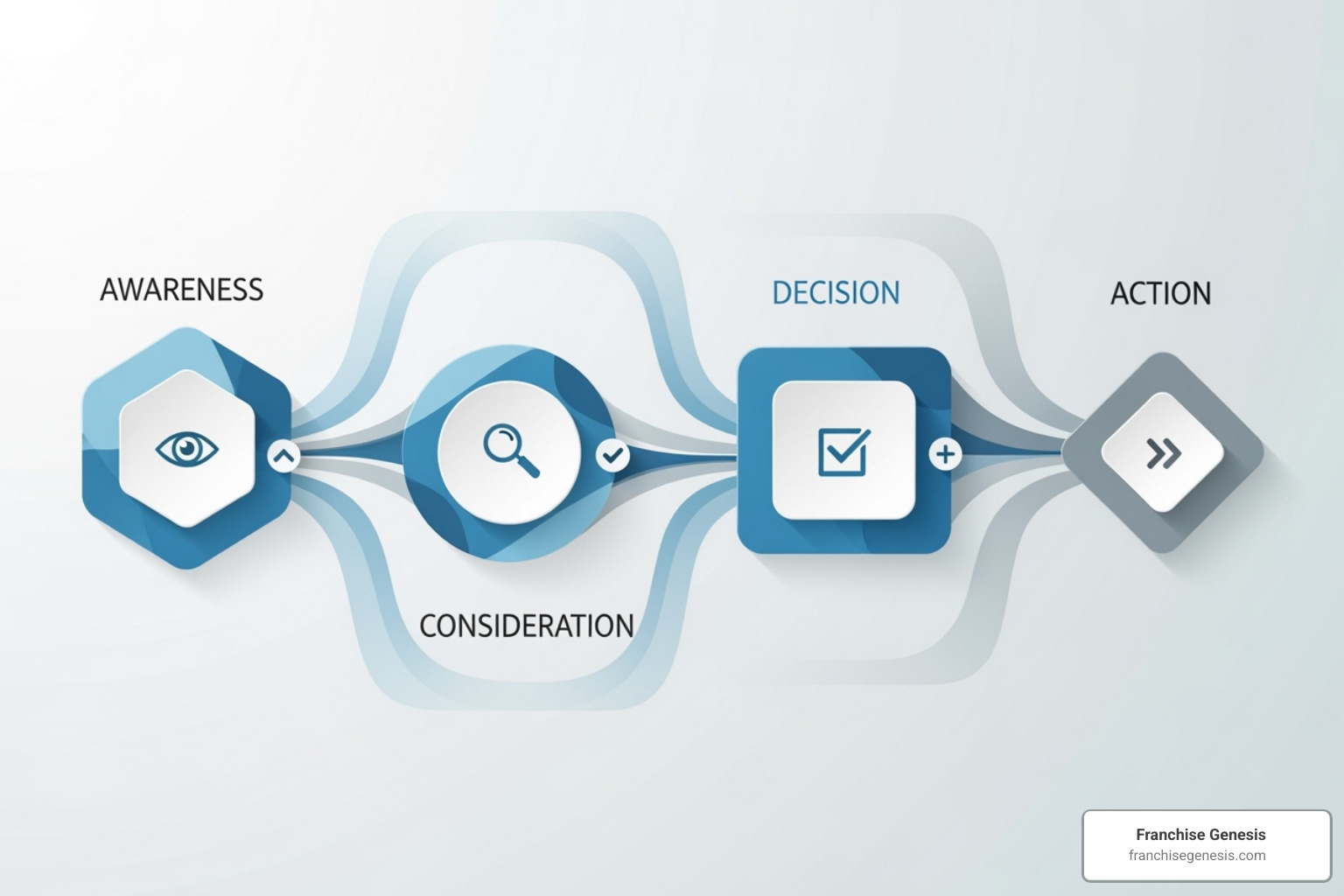Why Business to Franchise Conversion is Changing How Companies Scale
From Business to Franchise Conversion is a powerful growth strategy for successful business owners. This strategic pivot allows an established business to leverage its proven model and brand recognition to expand rapidly without the massive capital investment required for traditional corporate growth.
What is Business to Franchise Conversion?
- Converting your existing business into a system where others license your brand and operating model.
- Generating revenue through initial franchise fees (typically $20k-$50k) and ongoing royalties (5-8% of gross sales).
- Maintaining brand control while franchisees manage day-to-day operations.
- Expanding through motivated owner-operators instead of hired managers.
Key Requirements for Conversion:
- Profitability: A 15-20% net margin is needed to ensure franchisee success after fees.
- Replicability: Systems must be teachable and easy to duplicate.
- Market Appeal: Demand for your product or service must exist beyond your local area.
- Operational Independence: The business must be able to run without your constant presence.
Having guided numerous businesses through this process, including scaling one franchise to over 100 locations in its first year, I’ve seen how the right systems can turn a single successful location into a nationwide brand.

Understanding Business to Franchise Conversion
From Business to Franchise Conversion is the process of turning your successful independent business into a replicable system that other entrepreneurs can operate under your brand. Instead of joining a franchise, you become the franchisor, packaging your proven methods into a comprehensive playbook for others to follow.
This strategy leverages your existing success—the hard work of building customer loyalty and profitable operations—and shares that knowledge with motivated business owners. It involves developing detailed operational procedures, creating training programs, and establishing support systems to distill your experience into a step-by-step guide.
For more information about franchising your business, you can explore our detailed guide: More info about franchising your business
What Makes a Business Franchisable?
Not every business is ready for franchising. An ideal candidate for From Business to Franchise Conversion has several key characteristics:
- Profitability: A healthy net margin of 15-20% is crucial. This ensures franchisees can be profitable after paying royalties and covering their investment.
- Simplicity: The operation must be teachable. Think of McDonald’s—they created systems so straightforward that they can be executed consistently with minimal specialized training.
- Systemization: Every process, from opening to closing, must be documented and standardized. If your business relies on unique skills that can’t be taught, franchising is not a viable path.
- Brand Appeal: Your brand and customer demand must extend beyond your local market. The concept should be viable in different geographic areas and demographics.
- Owner Independence: The business must run smoothly without your daily, hands-on involvement. This proves the system works and gives potential franchisees confidence in the model.
How Conversion Differs from Other Growth Models
When expanding, you have several options. From Business to Franchise Conversion offers unique advantages over corporate expansion or starting a new concept from scratch.
Business Conversion vs. Starting a Franchise from Scratch vs. Corporate Expansion have different requirements for capital, risk, speed, and control.
- Capital Investment: In conversion franchising, your capital investment is low because franchisees fund their own locations. This is a sharp contrast to corporate expansion, where you fund everything.
- Risk Level: Risk is shared with franchisees, who are highly motivated because they’ve invested their own money. With corporate expansion, all financial risk is on you.
- Speed of Growth: Franchising allows for rapid market penetration, as multiple franchisees can open locations simultaneously. This speed is nearly impossible to achieve with a corporate growth model.
- Operational Control: You maintain high-level control over brand standards and procedures, while franchisees handle daily management. This allows you to ensure quality without getting bogged down in the operations of individual units.
Evaluating the Strategic Move: Pros, Cons, and Suitability
Deciding to pursue a From Business to Franchise Conversion is a pivotal moment that reshapes your business’s future. Your role will shift from running a location to orchestrating a network, and you’ll trade some autonomy for the power to scale exponentially. This requires a change in leadership style, from being a hands-on problem-solver to an architect of systems that help others succeed.

The Benefits for Your Business (The Franchisor)
A successful From Business to Franchise Conversion can be transformative. Here are the primary benefits:
- Rapid, Low-Capital Expansion: Leverage franchisee capital to open new locations, allowing for much faster growth than you could achieve with your own funds.
- Motivated Owner-Operators: Franchisees have skin in the game. Their financial stake ensures they are more motivated and dedicated than typical employees.
- Increased Brand Recognition: Each new franchise acts as a billboard for your brand, creating a snowball effect of awareness that attracts more customers and potential franchisees.
- Predictable Revenue Streams: Generate upfront capital from initial franchise fees ($20k-$50k) and create a steady, growing income from ongoing royalties (5-8% of gross sales).
- Turn Competitors into Allies: Existing independent operators in your industry may choose to convert to your brand, joining your system instead of competing against it.
For a deeper dive into the strategic advantages, check out our guide: Why You Should Franchise
Challenges and Disadvantages to Consider
This path has real challenges that can derail unprepared business owners:
- Loss of Direct Control: As a franchisor, you must think systematically for the entire network. You can no longer make unilateral decisions on a whim.
- Supporting Franchisees is a Full-Time Job: Your role shifts to training, troubleshooting, and supporting your franchisees. It’s a significant commitment of time and resources.
- Significant Legal and Compliance Costs: Franchising is heavily regulated. Expect to invest tens of thousands in legal fees for your Franchise Disclosure Document (FDD) and state registrations.
- Finding the Right Franchisees: Recruiting partners with the right capital, values, and work ethic is challenging. A bad choice can damage your brand.
- Reputation Risk: Your brand’s reputation is only as strong as your weakest franchisee. Poor performance at one location can negatively impact the entire system.
- Psychological Shift for Owners: Independent operators can struggle with the transition from complete autonomy to being part of a larger system with ongoing fees.
For more insights on navigating these challenges, this resource provides valuable perspective: Conversion Therapy: Planning To Enter Franchising By Converting Independent Business To A Franchise Brand
Key Factors in the From Business to Franchise Conversion Decision
How do you know if this move is right for you? Focus on these critical factors:
- Business Readiness: Your business must be profitable (15-20% net margin) and systematized to run without your constant presence.
- Financial Stability: You need significant capital for legal fees, system development, and building your support infrastructure before you collect your first franchise fee.
- Personal Readiness: Are you prepared to shift from an operator to a coach and mentor? Your willingness to adapt your leadership style is crucial.
- Market Conditions: Ensure there is demand for your concept in other regions and that economic trends support growth in your industry.
- Industry Suitability: Some industries are naturally suited for franchising due to proven demand, replicable systems, and broad appeal. These include Home services, Restoration, Real estate brokerages, Hospitality, Auto repair, and certain Professional services.
The Essential Steps for a Successful From Business to Franchise Conversion
Starting on a From Business to Franchise Conversion requires a structured, step-by-step approach to build a scalable and replicable system. This systematic process ensures your business is truly ready for franchise growth.

Step 1: Systemize and Document Everything
This is the foundation of a successful From Business to Franchise Conversion. You must document every aspect of your business operations, from daily procedures and customer service protocols to marketing and inventory management. The goal is to create a comprehensive Franchise Operations Manual that serves as the bible for your franchisees.
This manual should include Standard Operating Procedures (SOPs), checklists, and training materials that make your business easy to teach. A crucial part of this step is the “hands-off test”: hire a manager and step back to see if the business can run successfully based on your documented systems. This proves the model is replicable and not dependent on your personal touch.
Step 2: Develop the Franchise Model and Legal Framework
With your systems documented, you must formalize your franchise model and establish the legal framework. This is a complex area where expert guidance is essential.
The cornerstone is the Franchise Disclosure Document (FDD), a legal document providing prospective franchisees with detailed information about the opportunity. The FTC heavily regulates franchising, and you must hire a qualified franchise attorney to draft your FDD. Do not attempt to do this yourself.
Alongside the FDD, you’ll develop a franchise agreement that defines the contractual relationship. This includes the royalty structure (typically 5-8% of gross revenue), initial franchise fees ($20,000-$50,000), and territory rights.
You will also need to choose a legal entity for your franchisor business (e.g., LLC, Corporation) and register to sell franchises in applicable states. For more information, see our Franchise Registration States Guide.
Step 3: Build Your Franchisee Support and Sales System
The final step is to create a robust support infrastructure and a clear sales strategy. Your franchisees’ success is your success.
Your support system must include comprehensive training programs, both initial and ongoing. You’ll also need to provide operational guidance, marketing assistance (brand guides, ad templates), and access to key technology platforms (CRM, POS). This continuous support is vital for maintaining brand consistency and helping franchisees thrive.
Finally, develop a strategy for selling franchises. This involves defining your ideal franchisee profile, creating marketing materials, and establishing a sales process to attract qualified candidates. A proven strategy is key to Transform Leads Into Loyal Franchisees With A Proven Sales Strategy.
Getting franchise-ready typically takes 6 to 12 months, but this investment in a solid foundation is critical for long-term growth.
Key Financials and Common Pitfalls
Understanding the financial landscape and avoiding common missteps are crucial for a successful From Business to Franchise Conversion. Smart planning is essential for the long-term health of your franchise system.
Financial Realities of From Business to Franchise Conversion
While franchising reduces your capital outlay compared to corporate expansion, there are still significant financial considerations:
- Franchise Development Costs: This is your initial investment to become franchise-ready. It includes legal fees for the FDD, consulting fees, and costs for creating training and marketing materials.
- Initial Franchise Fees: Typically ranging from $20,000 to $50,000, these fees often just cover your costs for recruiting, training, and launching a new franchisee. They are not pure profit.
- Ongoing Royalties: This is your primary recurring revenue stream, usually 5-8% of a franchisee’s gross revenue. This fee funds your ongoing support, brand development, and franchisor profitability.
- Marketing Fund Contributions: Most systems require franchisees to contribute 1-3% of gross sales to a collective advertising fund that benefits the entire brand.
- Franchisee Startup Costs: While you don’t pay these, you must understand them thoroughly (e.g., build-out, equipment, inventory) to attract qualified candidates who are financially prepared for success.
Common Mistakes to Avoid
Even a great business can fail at franchising by falling into predictable traps. Avoid these common mistakes:
- Assuming Success Equals Franchisability: A busy location doesn’t guarantee a replicable model. Success might depend on your personal touch or local factors that don’t transfer to other markets.
- Underestimating Support Needs: Franchisees require extensive training, ongoing operational guidance, and marketing help. Be prepared for this significant commitment.
- Skipping Legal Due Diligence: Attempting to create your own FDD or ignoring state registration laws is a recipe for disaster. Hire a qualified franchise attorney from day one.
- Not Testing the Model’s Independence: If your business can’t run profitably without you, it’s not ready for franchising. This test reveals gaps in your systems that must be fixed.
- Ignoring the Franchisee’s Perspective: The model must offer franchisees a realistic path to a strong return on investment after all fees. If the numbers don’t work for them, you won’t attract quality partners.
- Rushing the Process: Launching with incomplete systems or poorly vetted franchisees will damage your brand and hinder future growth. Take the time to build a solid foundation.
Frequently Asked Questions about Business to Franchise Conversion
Business owners exploring From Business to Franchise Conversion often have similar questions. Addressing these common concerns can clarify what the journey entails.
How long does it take to turn a business into a franchise?
Properly executing a From Business to Franchise Conversion typically takes 6 to 12 months. Rushing this process is a common and costly mistake. The timeline generally breaks down into three overlapping phases:
- Documentation and System Testing (3-6 months): This involves creating your operations manual and, more importantly, testing whether another person can run the business successfully using only your documented systems.
- Legal FDD Creation (2-3 months): Working with a qualified franchise attorney, you will draft your Franchise Disclosure Document, franchise agreements, and establish your legal entity.
- Building Support Systems (2-4 months): This phase involves creating training programs, marketing materials, and setting up the technology platforms your franchisees will need.
Taking the time to do this right from the start will save you significant challenges later on.
What kind of support do new franchisees need?
New franchisees require comprehensive support to succeed. Your role as a franchisor is to provide it. Key areas include:
- Initial and Ongoing Training: Comprehensive education on every aspect of your business model, from operations to customer service, with continuous updates.
- Grand Opening Support: Assistance with local marketing, setup, and on-site support during the crucial first weeks to ensure a strong launch.
- Operational Guidance: A system for providing quick, helpful answers to the daily questions franchisees will have about staffing, customer issues, and more.
- Marketing Assistance: Professionally designed materials, brand guidelines, and support for local and national advertising campaigns.
- Technology Support: Reliable support for your POS system, CRM software, and other essential technology platforms.
- Peer Network Access: Facilitating connections between franchisees through forums or conferences so they can share best practices and support each other.
For more details, explore our Services for Franchisors and Franchisees.
Can I convert my business if it’s not highly profitable yet?
This is challenging but not impossible. The 15-20% net margin benchmark is the ideal because it ensures a franchisee can earn a decent living after paying royalties and other fees. If your own location isn’t demonstrating strong profits, it’s difficult to convince someone to invest.
However, if you have a strong, unique concept and can demonstrate a clear and proven path to profitability for a franchisee, you may be able to move forward. This might be the case if your current business is in a heavy reinvestment phase or has unusual costs that won’t apply to franchisees.
The key is complete transparency. Be honest about the financial realities and show how your system helps franchisees achieve better margins than they could on their own. If you’re not there yet, consider spending 6-12 months optimizing your operations to boost profitability before you begin the conversion process.
Paving Your Path to Nationwide Growth
From Business to Franchise Conversion is more than an expansion strategy; it’s an opportunity to build a lasting legacy. By converting your business, you empower other entrepreneurs to achieve their dreams while multiplying your brand’s impact across the country.
The journey requires meticulous planning, solid systems, and an unwavering commitment to supporting your franchisees. The work you do upfront—documenting processes, testing your model, and creating training programs—is the bedrock upon which your franchise empire will be built.
Without a solid foundation, even the most promising concepts can fail. That’s why expert guidance is so critical. A partner who knows the intricacies of franchise development can help you avoid common pitfalls and accelerate your growth without cutting corners.
At Franchise Genesis, we have walked this path with countless business owners. We provide the strategic insights and practical tools needed to transform your vision of nationwide growth into a reality. Your successful business proves you’ve created something special. Now it’s time to scale that success.
Ready to explore how your business can become a thriving franchise network? We’re here to help you pave that path.

